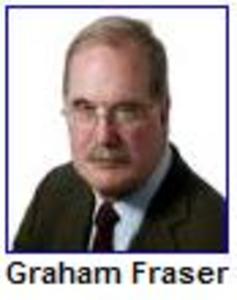As Canada's Commissioner of Official Languages, I was intrigued to see how angry your editorial board became at the idea that there should be a national standard for evaluating how well students who have studied French have learned it ("Speaking of waste … ," editorial, Feb. 9). And I was disappointed by how many errors were contained in a single, short editorial. In only a few words, I was accused of fantasy, compulsion, harassment, profligacy and, by implication, irrelevance.
The editorial seems to take the view that Canada's language policy is designed to make all Canadians bilingual and force all public servants to learn French. Wrong. The policy is, and has been, for almost 40 years, to ensure that Canada's French-speaking Canadians -- four million of whom speak no English -- get the same quality of service from the federal government as English-speaking Canadians -- 20 million of whom speak no French. In addition, the policy is designed to protect minority-language communities -- the million francophones outside Quebec, and the million anglophones in Quebec.
To serve Canadians effectively, the federal government, Canada's largest employer, needs employees who can speak both languages. However, very few of the bilingual positions are in Saskatchewan, let alone Moose Jaw (as your editorial falsely suggests): Out of 4,500 federal jobs in Saskatchewan, only 180, or 4%, require both official languages.
Let me put the issue of student language testing in context. The notion is hardly revolutionary. Almost a decade ago, Edmonton's public school system conducted a study to determine the best way to ensure that French was being well-taught in the schools it governs. The educators concluded there was value in regularly evaluating the progress students have made.
Since then, the Canadian Association of Second Language Teachers has done a study on the idea of introducing a common framework for language so that students across Canada would know how well they were doing in comparison with others. The provincial Committee of Ministers of Education is now studying this idea.
Nor is the idea of implementing national (or provincial) standards for students revolutionary. The Red Cross uses this sort of system to rate progress in swimming, and the Ontario Ministry of Education uses it in assessing reading and mathematics so that parents can know how well their children's school ranks with other schools. The Fraser Institute does a similar evaluation of schools, just as Maclean's does a survey of universities, and L'actualite does a survey of schools in Quebec.
The news story on which the Post's editorial is based was written by Janice Tibbetts, who covers education for Canwest News Service. She asked me in an interview what I thought of the idea of language testing. Even though the subject is outside my direct purview, I said I thought the idea was a good one. I think it could be useful for students, teachers, parents and schools. It should be an issue of opportunity and quality, not an issue of obligation.
This has nothing to do with whether Canada is a bilingual country or a country with English-speaking and French-speaking societies that live side by side. The federal government is committed, by law, to ensuring that French-speaking Canadians and English-speaking Canadians get the same level of service, and to ensuring that the 100,000 French-speaking Canadians who work for the federal government in certain parts of the country have the right to work in French, just as most federal public servants in Quebec have the right to work in English.
Respecting language rights does not mean that federal public servants in Moose Jaw have to speak French. But I think it does mean that students in Moose Jaw should have the same opportunity to learn French as they do to learn algebra or physics. There are a number of good reasons for taking advantage of such an opportunity, including being able to understand the country as a whole, and being able to aspire to rising in the executive ranks of Canada's largest employer, the federal government.
- Graham Fraser is Canada's Commissioner of Official Languages.


























Laissez un commentaire Votre adresse courriel ne sera pas publiée.
Veuillez vous connecter afin de laisser un commentaire.
Aucun commentaire trouvé